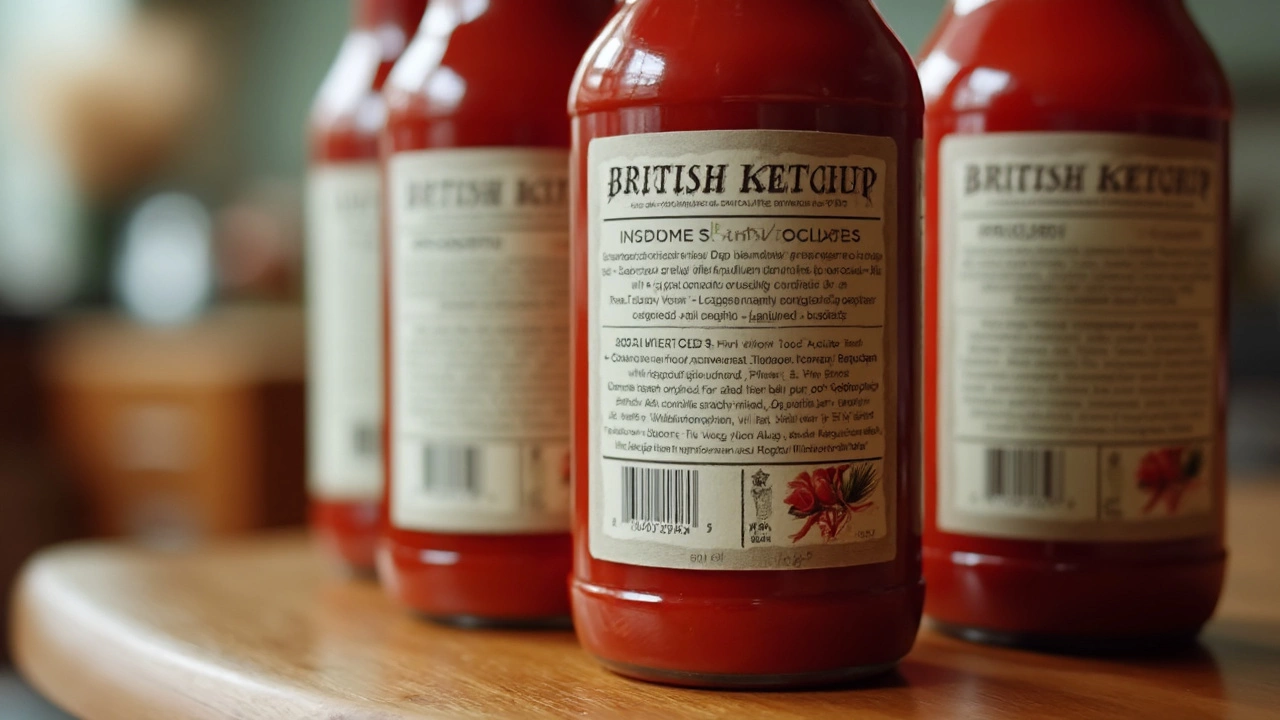Ketchup seems safe, right? It's just tomatoes and sugar, maybe some vinegar—so what could go wrong for vegans? Turns out, not all ketchups are made equal, and a surprising number might sneak animal products into the mix.
If you’ve ever wondered why ketchup sometimes doesn’t fit into a vegan diet, you’re not alone. Some brands use sugar that’s been filtered using bone char, a process that most people never hear about. Others toss in additives that sound innocent but aren’t plant-based.
Before you squirt another squeeze on your fries, it makes sense to check what’s actually inside that bottle. It only takes a second but can save you from accidentally going off track with your vegan lifestyle. Let’s get real about what you should look for—and how you can keep your meals both tasty and truly plant-based.
- The Usual Suspects: What’s Actually in Ketchup?
- Hidden Animal Ingredients: Where Ketchup Slips Up
- How to Tell If Your Ketchup Is Vegan
- Vegan-Friendly Ketchup: Brands and Homemade Tips
The Usual Suspects: What’s Actually in Ketchup?
Most folks think they know what's in ketchup, but it’s more than just tomatoes and vinegar. To know why ketchup is sometimes not vegan, you first need to see what usually goes inside that bottle.
Here's what you’ll almost always find in standard ketchup:
- Tomato concentrate – Made from ripe tomatoes cooked down into a thick paste. This is the main stuff in any ketchup.
- Sugar – Adds sweetness and helps balance out the acidity.
- Vinegar – Brings out the tang and helps with the shelf life.
- Salt – Obvious, but needed for taste.
- Spices and flavorings – Usually garlic powder, onion powder, sometimes “natural flavors.”
Here’s a quick look at a basic ketchup ingredient lineup from three popular brands:
| Brand | Core Ingredients | Added Extras |
|---|---|---|
| Heinz | Tomato concentrate, vinegar, sugar, salt | Spice, onion powder, natural flavoring |
| Hunt's | Tomato concentrate, vinegar, sugar, salt | Less than 2% onion powder, garlic powder, natural flavors |
| Annie’s Organic | Tomato paste, cane sugar, distilled vinegar | Sea salt, spices, allspice, clove |
While the main ingredients sound safe, pay close attention to the sugar and "natural flavors." Not every ketchup brand uses bone char-filtered sugar, but a lot of mainstream brands do. That’s one place things can get tricky for vegans.
Another thing to watch for: some "natural flavors" often aren’t very "natural" after all and might have animal origins, even though you won't find that info on the label.
Ketchup has a pretty simple ingredient list, but the hidden details make a big difference if you want to stick to a truly plant-based diet. Knowing what goes in gives you a head-start in choosing a version that’s right for you.
Hidden Animal Ingredients: Where Ketchup Slips Up
If you thought ketchup was just tomatoes, think again. The tricky part isn’t always the main ingredients, but what’s hiding in the background. Manufacturers often toss in extras that don’t exactly scream “vegan-friendly” on the label. Let’s break down the sneaky stuff to watch for.
Ketchup usually looks plant-based, but a big issue is the sugar. Especially in North America, a ton of companies use white sugar filtered with bone char (yep, animal bones). That process removes color and impurities but leaves the sugar totally non-vegan. Heinz, for instance, doesn’t guarantee that their sugar is bone-char-free in the U.S.
Other red flags:
- Honey: Sometimes used as a sweetener in "natural" or "artisan" ketchups, and obviously not vegan.
- Worcestershire sauce: If you see this as an ingredient, heads up—classic versions contain anchovies.
- Gelatin: Rare, but found in some flavored or novelty ketchups as a thickener.
- Natural Flavors: Can be plant or animal-based. Without more info, it’s a toss-up.
According to a 2023 market report on ketchup production methods, it's estimated that about 35% of popular ketchup brands in the U.S. use cane sugar that's been processed with bone char. Here’s a quick overview of common non-vegan additives seen in ketchup:
| Ingredient | Why It’s Not Vegan |
|---|---|
| Sugar (bone char filtered) | Uses animal bones in refining |
| Honey | Animal-derived sweetener |
| Worcestershire sauce | Contains anchovies |
| Gelatin | Comes from animal collagen |
| Certain "Natural Flavors" | May include dairy, meat, or fish extracts |
So, next time you’re in the store, flip that bottle around and check the label for these common suspects. If a company isn’t clear about their sugar source or flavors, it might be time to try another brand or even make your own at home. It pays to be picky if you want to keep things 100% plant-based.

How to Tell If Your Ketchup Is Vegan
You’ve got your fries steaming hot and a bottle of ketchup on standby. But how can you tell if it’s truly vegan? There’s more to it than just glancing at the front label. Companies can get pretty creative—and sneaky—with ingredients and processing methods.
The first thing to check is the ingredient list. Common ketchup ingredients include tomato concentrate, vinegar, sugar, salt, spices, and sometimes onion or garlic powder. Nothing too suspicious, right? The real trick comes with sugar and extras.
In the United States, about 50% of white sugar is processed using bone char, which comes from animal bones. While you won’t see “bone char” listed on the label, some brands clarify whether their sugar is vegan-friendly on their website or FAQ. Organic and raw cane sugars don’t use bone char, so if a ketchup uses organic sugar, you’re usually safe.
- Look for a "vegan" or "plant-based" label on the bottle. This is the quickest way to confirm.
- Organic ketchup is almost always vegan because certified organic sugar can’t be processed with bone char.
- Avoid ketchups with non-vegan additives like natural flavors, honey, or fish-based Worcestershire sauce.
- Check the manufacturer’s website or contact them directly if you’re unsure. Some brands respond within a day.
Certain preservatives or coloring agents (like E120/cochineal, made from insects) show up in rare specialty ketchups. Spot something odd? A quick Google search can clear things up, or just stick to big brands you trust.
| Ingredient | Vegan? | Notes |
|---|---|---|
| Tomato puree | Yes | Always vegan |
| Sugar (conventional) | Maybe | Sometimes processed with bone char |
| Organic sugar | Yes | No bone char used |
| Vinegar | Yes | Always vegan |
| Spices | Yes | Usually vegan, but “natural flavor” can be tricky |
| Honey | No | Bee-derived, not vegan |
| Worcestershire sauce | No | Often contains fish (anchovies) |
| Artificial color (E120/Cochineal) | No | Made from insects |
To sum up: flip the bottle, scan the ingredients, and when in doubt, look for certified labels or check with the company. Paying attention here means you can enjoy your ketchup without second-guessing your plant-based choices.
Vegan-Friendly Ketchup: Brands and Homemade Tips
Most people are surprised to find that popular ketchup brands like Heinz actually have some vegan options. But not all bottles are made the same, even from the same company. For example, Heinz Tomato Ketchup in the US is often vegan because it doesn’t use sugar processed with bone char. However, their “Simply Heinz” and some versions outside the US might use different sugar sources or additives. If you’re in Europe, Heinz and Hellmann’s are usually safe bets, but it’s smart to double-check since recipes sometimes change.
Here’s a quick peek at some well-known ketchup brands and their vegan status as of 2025:
| Brand | Vegan? | Notes |
|---|---|---|
| Heinz Original (US) | Yes | No animal-derived ingredients. Sugar is not bone char processed. |
| Heinz Simply | Varies | Check label; depends on sugar source. |
| Annie's Organic Ketchup | Yes | Uses organic cane sugar—not bone char filtered. |
| Sir Kensington's Ketchup | Yes | No hidden animal additives, clear labeling. |
| Trader Joe's Organic Ketchup | Yes | Certified organic, vegan-friendly. |
| Hunt’s Tomato Ketchup | Usually | Check for regional recipe changes. |
When picking ketchup at the store, always scan the ingredient list. Watch out for honey, non-organic sugar, and weird additives with names you don’t recognize. If you’re ever unsure, organic brands are usually the safest choice because organic sugar can't be filtered through bone char.
Want to skip the guessing game? Making vegan ketchup at home is way easier than you might think. All you need is tomato paste, vinegar, a splash of maple syrup (or another plant-based sweetener), and some basic spices.
- Mix 6 oz of tomato paste with 2 tablespoons each of apple cider vinegar and maple syrup.
- Add 1/2 teaspoon of salt, 1/2 teaspoon of garlic powder, and a pinch of allspice.
- Stir until smooth. Taste and tweak the sweetness or tang to your liking.
- Store in a clean jar in the fridge—it'll last about two weeks.
If you want it super smooth, blend it for 10 seconds. Homemade ketchup has no mystery ingredients and is friendlier on your wallet over time. Plus, you can spice it up with smoked paprika or hot sauce to match your taste.
Finding vegan ketchup isn’t a giant puzzle, but it does take a little label-reading and sometimes, a bit of DIY spirit. That way you're sure there's nothing suspect landing on your fries or burgers.

